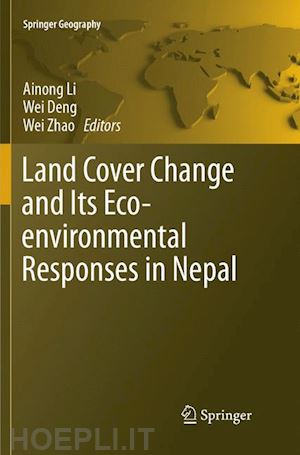
Questo prodotto usufruisce delle SPEDIZIONI GRATIS
selezionando l'opzione Corriere Veloce in fase di ordine.
Pagabile anche con Carta della cultura giovani e del merito, 18App Bonus Cultura e Carta del Docente
This book offers a systematic investigation of the ecological and environmental issues related to the land cover changes in Nepal by researchers from both China and Nepal. It discusses the eco-environmental issues faced by Nepal, particularly in the hills and mountain regions. It also sheds light on the global concerns regarding the eco-environment issues of mountains, and analyzes the various causes and potential consequences of eco-environmental degradation in Nepal. The book is of particular interest to students, researchers, experts, and decision-makers wanting to gain a general overview of land cover in Nepal and its dynamics, environment and natural resources, as well as mountain hazards.
Introduction.- Physical geography of Nepal.- Part I Land cover Status of land cover and its dynamics since 1990s in Nepal.- Forest resource in Nepal and its spatio-temporal change.- Land use and Land Cover Change in the Siwalik Hills and Tarai, Nepal and its Environmental Implication.- Land cover change and its driving forces in the Koshi region, Eastern Nepal.- Livelihood and land use pattern of Melamchi basin in mountainous areas of central development region in Nepal.- PartII Eco-environment Ecosystem Trends and Issues in Nepal in the Context of Evolving Earth Observation Technologies.- Geo-Information Based Soil Erosion Modeling for Sustainable Agriculture Development in Khadokhola Watershed, Nepal.- Agriculture Land Abandonment Situation in the Western Hill of Nepal.- Impacts of soil erosion on soil organic carbon and total nitrogen in terraced fields and forestland in the Middle Mountains of Nepal.- PartIII Livelihood Livelihood diversification amidst shocks and stresses in the mountain areas of Nepal: Examples from two villages of Mustang district.- Livelihood of the Street Vendors and their Social Development and Management in the Mountains of Nepal: the case of Kathmandu Valley cities.-Assessments of Climate Change Indicators, Vulnerable Groups and Indigenous Adaptation Strategies: A Case from High Mountain of Nepal.- Spatial differentiation of poverty in Nepal.- Household livelihood strategies and their determinants in rural areas of central Nepal.- Part IV Geo-hazards Earthquake Mitigation and Its Effect on Eco-environment and Social Development: A Case Study from Tamakoshi River Basin of Central Mountain Region of Nepal.- Diversified research on mountain hazards distribution and prevention in Koshi river basin.- Post earthquake geological hazards investigation and analysis: A case study of the Sino-Nepal Highway.
Dr. Ainong Li is a research professor and director of the Research Center for Digital Mountain and Remote Sensing Application of the Institute of Mountain Hazards and Environment (IMHE), Chinese Academy of Sciences (CAS). He has been awarded by the “Hundred talents program” of CAS, the “Thousand talents program” of Sichuan province, and the "Western Light" talent cultivation program of CAS. His research majorly focuses on quantitative mountain remote sensing, and he has made many academic achievements in automatic process technique for mountain remote sensing data, land cover/use classification and land surface parameters estimation in mountainous region, and emergency investigation and assessment techniques for mountain hazards. Over the last decades, he has participated in more 20 programs at the national or provincial and ministerial level. He has published more than 100 papers, including more than 30 SCI papers.











Il sito utilizza cookie ed altri strumenti di tracciamento che raccolgono informazioni dal dispositivo dell’utente. Oltre ai cookie tecnici ed analitici aggregati, strettamente necessari per il funzionamento di questo sito web, previo consenso dell’utente possono essere installati cookie di profilazione e marketing e cookie dei social media. Cliccando su “Accetto tutti i cookie” saranno attivate tutte le categorie di cookie. Per accettare solo deterninate categorie di cookie, cliccare invece su “Impostazioni cookie”. Chiudendo il banner o continuando a navigare saranno installati solo cookie tecnici. Per maggiori dettagli, consultare la Cookie Policy.